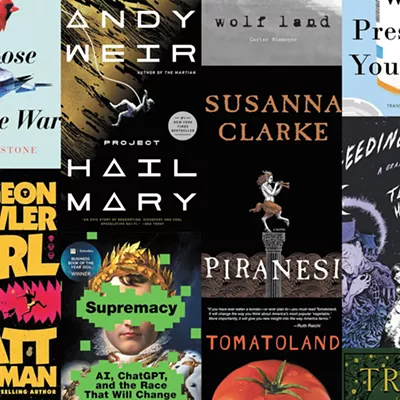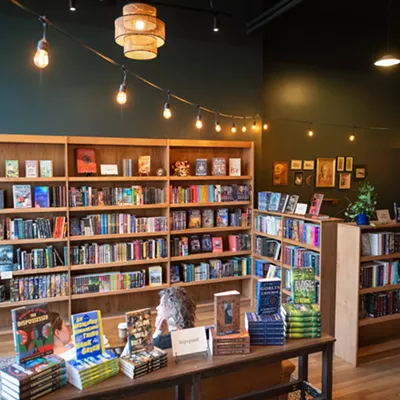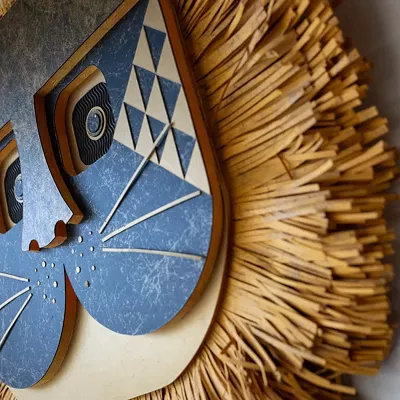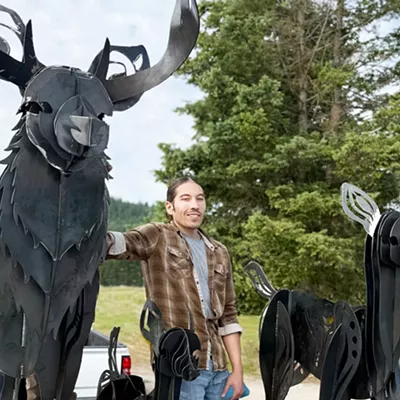Get Lit!
EWU’s 13th annual Get Lit! Festival kicks off next week with a variety of events under the umbrella of “Telling the American Story.”
Along with the writers profiled in this section, the first two days of Get Lit (April 13-14) feature three poetry slams, a “Women’s Votes” exhibit at the MAC, an art exhibit at Chase Gallery, and improv comedy (“Poets Up!”) at the Blue Door every Friday in April.
Next week, we'll highlight Get Lit’s final three days: Ani DiFranco’s musical and spoken-word performance, Sena Jeter Naslund on re-imagining Melville’s Moby Dick, Matthew Dickman’s all-American poetry, and Tim O’Brien’s Vietnam experience. In the meantime, visit ewu.edu/getlit for all the details.
Curiouser and Curiouser SCIENCE
Sam Kean is the chemistry teacher you should have had.
Students in other people’s classes glance at the periodic table — all those two-letter combinations and confusing numbers — and start snoring. But Kean has tales to tell.
His book from last July, The Disappearing Spoon, attaches human-interest stories to each of the hundred-odd elements. Liquid helium, for example — deep-freeze it, and it’ll flow up and over a wall. Kean describes super-acids that can eat through glass — and your hand. The surprising connections among your cell phone, a couple of obscure elements called niobium and tantalum, and the Rwandan massacres of the 1990s. What lithium — now commonly prescribed to those with a bipolar disorder — has to do with your circadian rhythm and level of creativity. Why one particular element is so feared in Japan that in one movie, Godzilla is killed off with cadmium-tipped missiles.
But Astounding Facts of Chemistry won’t help students write lab reports, and Kean realizes that his book is just a supplement to actual study. In a recent email, he lists the advantages of telling the elements’ human stories: “Especially when we can follow along with the historical process of discovery that scientists used,” he says, “and see where they made mistakes, and what their reasoning was at each point, we’re liable to retain that information.
“Readers will learn something about the periodic table from The Disappearing Spoon — not enough to ace an AP test, but something about each element, about all the places the elements pop up unexpectedly in daily life.”
And so what if he popularizes or even sensationalizes chemistry?
As Kean says, “Better that people get excited about chemistry at least once, rather than leaving them with only the bad memories of failed lab experiments and confounding equations.”
Sam Kean presents “Tales from the Periodic Table” • Thurs, April 14, at 7 pm • $15; free, students • The Bing • 901 W. Sprague • ewu. edu/getlit • 359-6977
Pastry Identity PERFORMANCE
Standup comic, public speaker, playwright, writer, un-presenter, tummeler — Heather Gold is such a Renaissance woman that she creates whole avenues of inquiry and then has to name them (often drawing on Yiddish).
The tummeling thing is a mindset and means of communicating that seeks to take unsatisfying one-sided interactions (customer-service calls, presentations, much discourse on the Web, basically all discourse in big corporations) and turn them into conversations. “Putting the human back into tech,” she says.
Gold’s contribution to Get Lit!, though, is her one-woman show “I Look Like an Egg but I Identify as a Cookie,” in which she relates a comingof-age (and coming-out) tale through the lens of baking. It’s Martha Stewart meets Dan Savage.
While she’s turning your notion of human sexuality on its head, she’s baking you chocolate chip cookies.
Not kidding. Told you she was Renaissance.
Heather Gold performs “I Look Like an Egg but I Identify as a Cookie” • Thurs, April 14, at 7 pm • Free • River Park Square, Kress Gallery (behind the food court) • 808 W. Main Ave.
Border Patrol IMMIGRATION
On Margaret Regan’s first foray into reporting on the Mexican border, she ran into a man named Ismael Vasquez. His friend Silverio had died hours earlier trying to cross into America.
She brought back a story with passages like these: “Silverio began to have dolor de corazón, Vasquez says, clutching his own chest to demonstrate his friend’s pain. And dolor de brazos, he adds, gripping his arms. And then, finally, simply, he died.” (Read the whole thing at tinyurl.com/tucsondesert.)
“Last summer turned out to be our second-worst summer for migrant deaths,” Regan says.
“So many migrant bodies, they had to bring a refrigerated truck ... It took me days to get over that smell of that truck.”
At Get Lit!, she’ll be drawing from her experiences and reading from her book, a collection of her reporting from the border, called The Death of Josseline: Immigration Stories from the Arizona Borderlands.
Josseline? She was someone else who tried to endure the Arizona desert after crossing the border. A 14-year-old girl.
Immigration Stories with Margaret Regan • Thurs, April 13, 7:30 pm • Free • Unitarian Universalist Church • 4340 W. Fort George Wright Dr.
Water Woman WARNING
Maude Barlow’s Blue Covenant isn’t science fiction.
It may be a jeremiad, but then again, an environmentalist’s warning is usually called that — until time proves it true.
Of course, Barlow isn’t the only one saying that the world faces a water crisis in the near future. She’s just one of the more persuasive and eloquent.
Twenty years from now, she predicts, residents in poverty-stricken countries — where the world’s biggest cities are booming — will have no way to treat their waste-water, thereby poisoning their only sources of drinking water. To feed the world’s growing population, industrial agriculture will drain aquifers and heavily pollute waterways, creating new deserts across the globe.
Corporations will purify the ocean’s salt water, and they’ll sell it at a huge profit. Thirsty cities will be deserted. Poor people will die.
With her eloquence, perhaps, Barlow will be able to convince the right people of the impending emergency. If we’re lucky, she’ll shift the momentum, and we’ll look back at her writings simply as tirades — pure science fiction.
Maude Barlow presents “The Battle for Blue Gold” • Wed, April 13, at 7 pm • SCC, Lair Auditorium, Bldg. 6 • Discussion with Maude Barlow and Sam Reed • Thurs, April 14, at 9:30 am • Free • SCC, Hagan Foundation Center for the Humanities, Bldg. 16, second floor • Mission Ave. and Greene St.




















